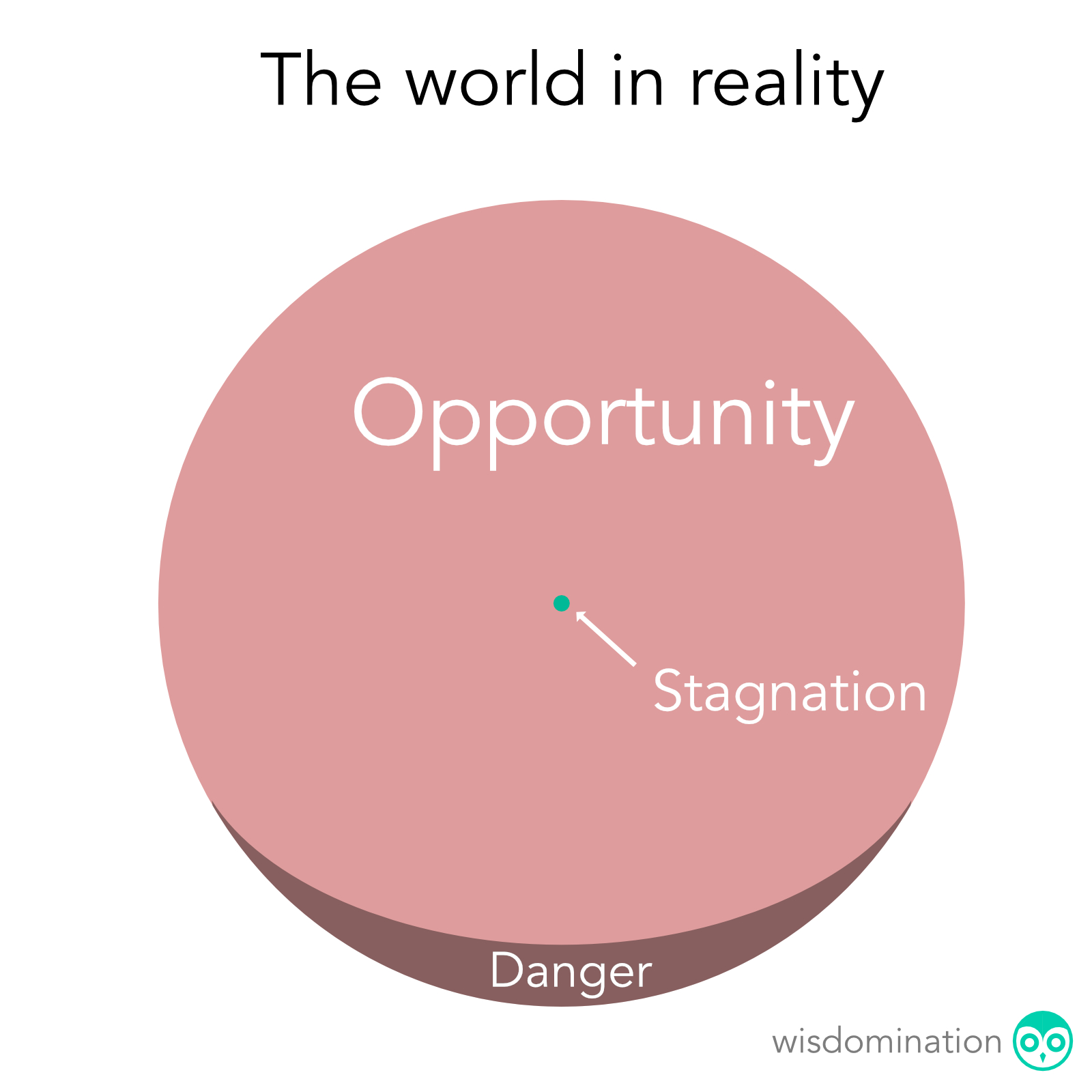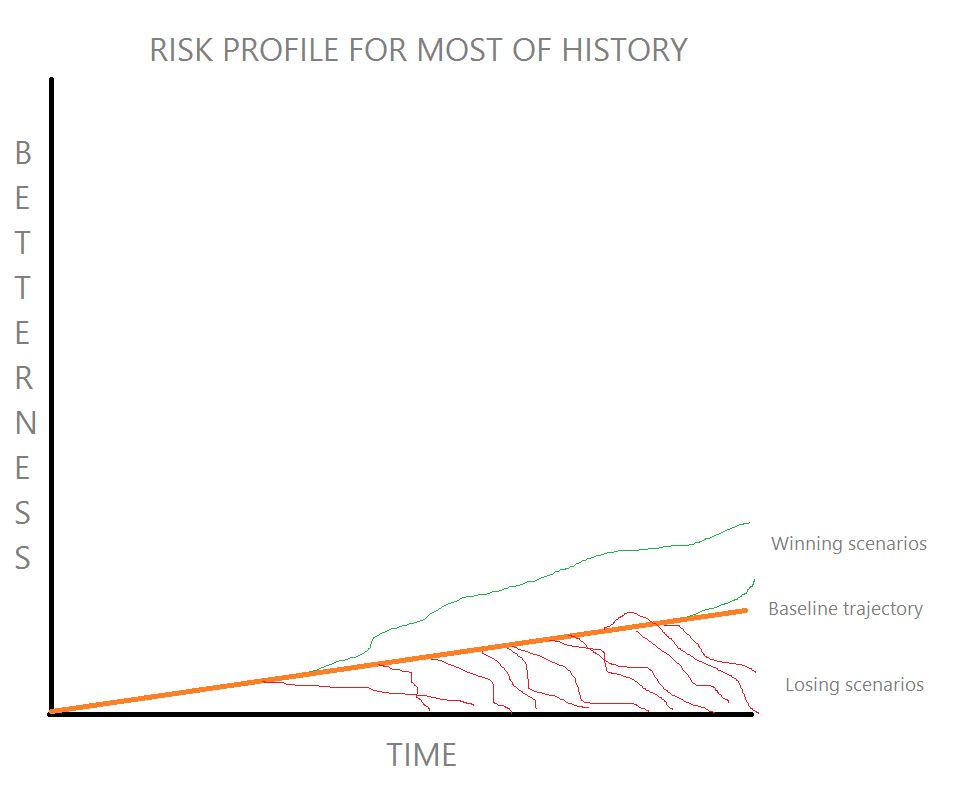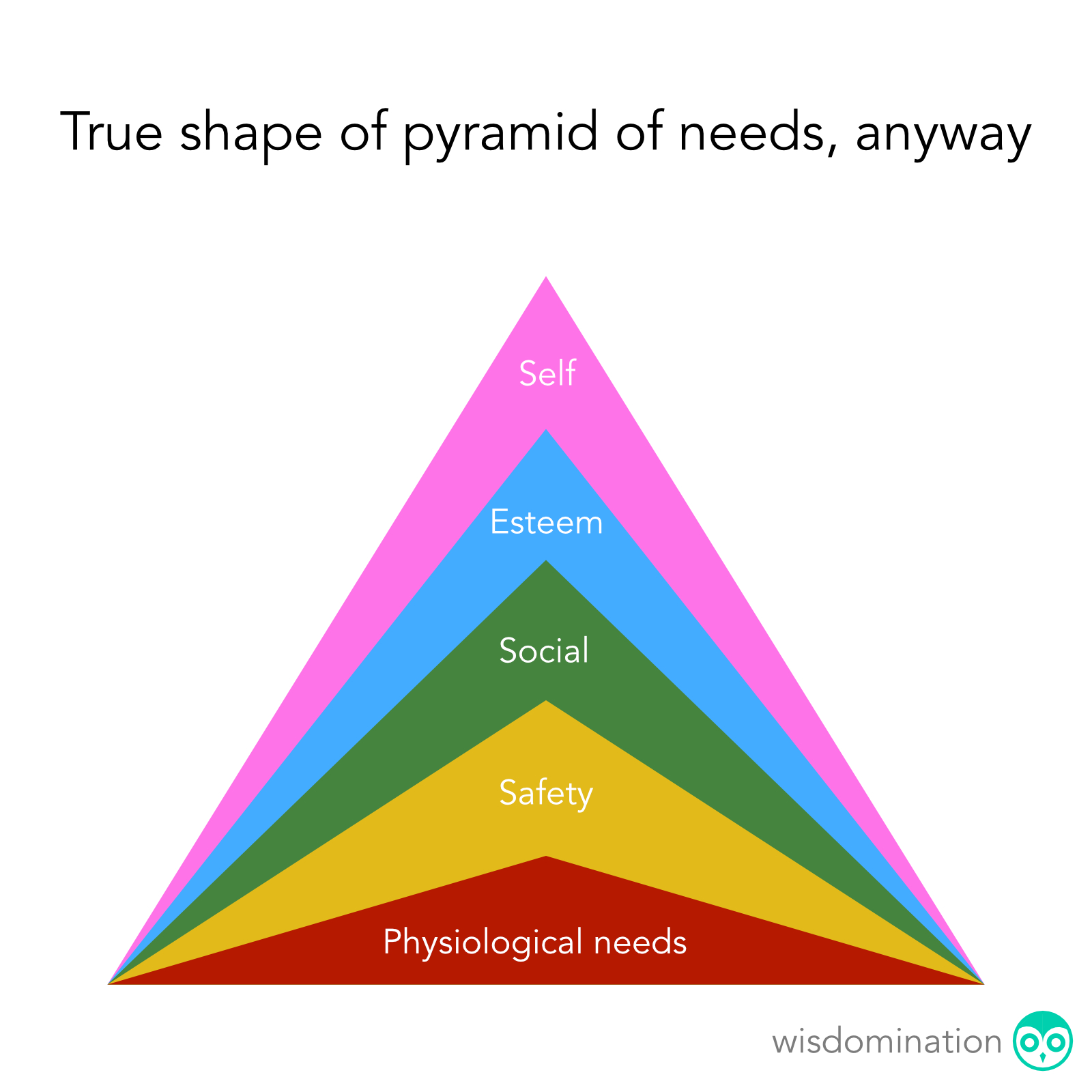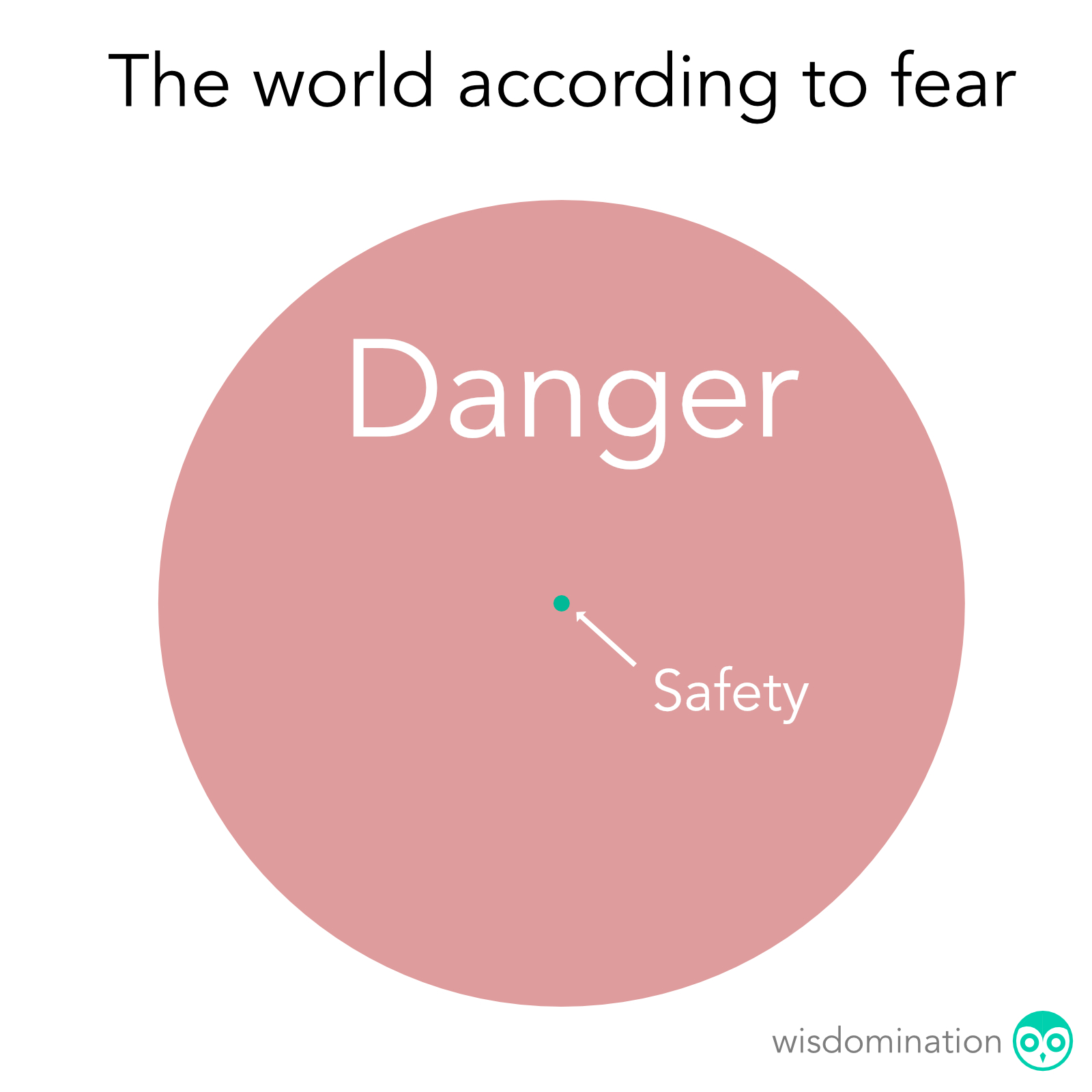People often suffer from the notion that they should wait for their lives to begin instead of living them – that something will – eventually – happen, the stars will align, and their lives will finally properly begin.
I call this imagined future event the “date with destiny”, or a “Disney moment”, because it appears to be inspired by fairy tales.
I want to tell you something very important about it. Yes, it is real, but there’s something even more important:
Here it comes. It is an act of will.
You don’t wait for it. You do it.
Let me share a story with you.
Seven years ago, in early 2010, I was in my mid twenties – and I was overweight, unhappy, stuck in a badly chosen major and a dead relationship, surrounded by toxic people, living in a virtually unfurnished apartment, sometimes going hungry for days, and crying regularly in the bath.
I was literally banging my head against the wall with self loathing, slept for fourteen hours a day (when not driven halfway to insanity by insomnia from guilt, hopelessness and depression), and my early twenties went by in a grey haze. It was the worst time of my life.
Then I mounted a last-ditch effort – and by late 2010, I shed 25 kilos, moved into a beautiful, bigger and cheaper flat overlooking a park, studied at arguably the most prestigious economic institution in central Europe, and holidayed in St. Moritz with the girl I’ve been fawning over for the majority of my adult life.
I’ll tell you how I did it. Mainly, I got angry. I realised I was fighting, in at least two senses, for my life.
I went all in, and powered through any sort of remorse or inhibition. I decided, planned and acted, with zero regard for anything already in place. It was “tear it all down and start on a green field”. Complete catharsis. Flushing out all, I guess you could call it psycho-causal inertia, and embarking on a wholly new course – not gradually, but a step change, discontinuously. It was pretty clear the alternative was a wasted life. What was there to lose?
The process, once the decision was made, was remarkably simple – if not easy. “From where” is more important than “where to”. You are defined, first, by what you said “no” to. Focus on having the right absences, on being free from the bad, because only then can you properly build the good. Very much like the quality of a house being more defined by the absence of swamps and dead cattle than by the presence of art nouveau teapots, which one cannot enjoy that much until the swamp is drained and the dead cattle dragged off.
It’s fortunately relatively simple to say “I quit”, “Let’s break up”, “Fuck off”.
The key is creative destruction. You start with dismantling your mistakes – mercilessly – and creating an empty table for a fresh start.
The fact the basic conditions are negative is excellent news – it takes away the anxiety/procrastination of “not even knowing where to begin”, because you begin by taking a massive fucking hammer the crappy bits of your life, which doesn’t require any special knowledge or deep planning. It means anyone can do it with nothing but resolve (courage, anger) – and then once you’ve done a bit of demolition work, the rest gets much easier and your sight is clearer. This starts a cathartic virtuous circle.
To paraphrase Jefferson very creatively, “He who has no life is closer to his ideal than one who lives the wrong life.”
The wrong thing is assuredly worse than nothing. Those are words to live by.
To help with this, and with great symbolic effect, I threw away most belongings and burned thousands of pages of notes and writing. Your physical environment can be either an impossible obstacle or a great help. It helps to give yourself a clean slate if you want to do this properly. Your products are repositories of your identity, and when that identity was flawed, they’re obstacles.
It was the best thing I ever did for myself.
Now, there’s a good chance you’ve led your life better than me prior to that point, and might not require such radical change – but even then, there may be one or more specific areas where you’ve numbed yourself, and that are really unsatisfactory at a close look. And even if your life is superficially satisfactory on balance, ask yourself whether it really is what you want – and, crucially, whether you aren’t waiting for things to become ideal on their own, or through luck or destiny at some point in the future. That is a particularly dangerous sort of procrastination and self-anaesthetics, abdicating the responsibility for living your life by bullshitting yourself that “it will happen eventually” to avoid facing the realisation you’ve given up.
We’re all, more or less, victims of inertia. As Breaking Bad put it: “Sometimes I feel like I never actually make any of my own choices. I mean, my entire life it just seems I never … had a real say about any of it”. Hands up if that sounds like you. Even the liars, come on. Good, now we’re at nearly 100% of people. Read on.
Your biggest enemy in life is your comfort zone – and a yearning for safety, predictability and harmony.
Instead, we should yearn for meaning, consciousness and satisfaction – given the two forces are almost perfectly contrary.
The widespread, irrational and deeply sub-optimal risk aversion is based on historical risk profiles, no doubt enforced by natural selection, that are no longer relevant to our modern situation. In 300 BC Scandinavia, a strong bias for safety over risk-taking was advised, unless you wanted to starve, and there were few opportunities to become anything much different than circumstances of birth commanded – and even then, most opportunities were to become dead in interesting ways.
But now? The risk profile has totally changed in the last century.
Note the modern risk profile is iterative – it doesn’t mean your odds are this good with every attempt, but that for the first time in history, you get enough relatively consequence-free attempts that success is largely a matter of perseverance and rolling the dice enough times until you win (and loading it in your favour).
Literally the worst thing that could happen under normal circumstances is sleeping on a futon and eating instant noodles for a couple of weeks. You have a practically unlimited number of attempts, and the only potential downside is sliding temporarily into a standard of safety and comfort that most humans who ever lived couldn’t even dream of. What the fuck would you fear?
What you really should fear, and what is the biggest and most pervasive danger in western societies, is passively coasting into a life you don’t really like, watching your dreams evaporate and lowering your expectations to avoid pain, opting for numbed complacency over real satisfaction, and making do with a life your 20 years old self couldn’t imagine tolerating for two seconds – a soul killing job to pay for a mediocre home and car, lying in bed next to someone you do not really love, watching the decades fly by towards the merciful embrace of dementia, dreams abandoned in the dust of disappointment. Which happens to the vast majority of people.
You will notice the “baseline trajectory” of a passive, risk-averse lifestyle is substantially below both the median and average of possible outcomes. “Going with the flow” is literally the worst possible strategy short of picking up a heroin habit.
And it is entirely self-inflicted, by acting as if life was far more dangerous, risk riskier, and success unlikelier than they really are.
This is why most people never grow beyond being beta-versions of themselves – they’re intuitively stuck with 1700s beliefs about risk and 1950s attitudes to careers (serfdom to huge organisations who in turn provide security – an arrangement that was an accidental and temporary artifact of pre-information technology industrial economies, and I promise you, is not coming back).
As a civilization, we have succeeded so much that the optimal strategy in life has changed from minimax to maximax – while it historically made sense to cover the downside and maximise the value of the worst-case scenario at the price of sacrificing upside opportunities, we have insured the downside so well that it is now in fact optimal to maximise the best-case scenario and play it pretty risky.
This all means you should worry much more about errors of omission than errors of commission.
The main risk is no longer doing something wrong, but not doing something right.
Tell me if you have you ever thought, like me, on lazy Sunday afternoons, one variant or another of this:
“The world is huge and wonderful and full of amazing things, and I’m sitting here like a domesticated animal, reliving the same few days over and over. Years go by like weeks, because nothing memorable happens. When in fact, I could just get in the car right this second and drive anywhere, maybe catch a boat and do literally anything. I could go to Finland and become a reindeer herder. The possibilities are practically endless. What exactly, apart from inertia and fear and the sense “that’s just not done” is preventing me from that? What’s the worst that could happen?”
Of course, we never – or rarely – do these things. I say we should.
When I look at my peer group, the straight-A student is slowly fattening up and living within whining distance of her parents (and often with them), while the erstwhile loser (who was told by teachers repeatedly he will never amount to much) spends time surfing in Sydney and banging his way through all of Latin America and Southeastern Asia’s most interesting women. Fair? Well, yes. Both got exactly what they aimed themselves at ten years ago.
I profoundly believe everyone should use their adult minds and best judgment to redesign their life from the ground up at least once in life, otherwise they’re just a product of accidental forces – and where’s the fun in that?
You have one life – it is too valuable to give away to someone else’s expectations and random chance.
If your life is more inertia than will, you’re robbing yourself and the world of who you could – should – be.
Often, people shy from resistance, but resistance is a sign that progress is made. Whenever you push forward, you feel resistance. It’s a good thing.
People hope for tension-free growth, for lazy progress that doesn’t ask for their presence of mind and proactive engagement, or hard decisions and leaps of faith. But if you really want to make something of your life, I assure you right here and now that there is no smooth, continuous, harmonious way from here to there.
No meaningful development is incremental, harmonious or smooth. It is revolutionary, not evolutionary. Harmony is stagnation in drag.
Your love for your comfort zone, however shitty it may be, and for lazily coasting through life, believing things will somehow take care of themselves (sublimated parent image), and for the contradictory notion of harmonious evolution, is your worst enemy in life.
In your heart of hearts, you probably already know where you might feel stuck, and what you really want instead – and need to do. Perhaps you’ve been putting it off or doubting it’s the right thing, or afraid of the difficulty and upheaval – but that is part of meaningful change.
It is always scary. And it is the best thing in the world.
Now, there are obvious caveats.
It’s hard to do from a favela, but perhaps more surprisingly, just as hard from a royal palace, or other position of hereditary obligation. A note on family companies – wise parents should take this into account and make sure their blessings are not sweetened curses – several of my old schoolmates had their wings clipped so they could take over unimpressive small businesses built by despotic, imperial parents, which (and whom) they could have easily outearned by moving abroad and doing almost anything else, and who are indeed outearned by far less talented but more proactive people who did.
Such gilded entrapment without meaningful launch windows into self-realisation might be why young Saudi royals, Chinese party princelings and divers such persons are among the unhappiest in the world.
One of these types of stuckness is obviously vastly more comfortable than the other, but the point is that both are obstacles to self-actualisation.
The optimal starting position is modest material comfort, some education and marketable skills, bit of savings – constrained neither by extreme need or obligation. Which is good news, because that’s most people, so statistically there are decent odds it’s you as well. That’s where you have the most freedom to explore and experiment, and the most to gain by it.
If you have the equivalent of a few thousand dollars in the bank and a passport that won’t get you laughed out of the airport, you can reinvent yourself into virtually any life you can think of.
Especially now, with first-class education resources available for free (or a low price) online, there’s objectively nothing standing in the way of anyone in the rich world being a bicycle repairman in Indonesia, a photographer in Burma, or an interior decorator in Vladivostok in less than a year.
It takes a bit more time to become a nuclear engineer, a neurosurgeon or a world-class writer, but even that is possible now.
For a popular contemporary choice, there are countless thousands of former frustrated manual labourers who turned themselves into programmers on ten times higher salaries in a matter of months.
The only obstacles are limited imaginations, inertia and fear, of course. But those can be trained into irrelevance.
The younger you are, the better, obviously. If you’re around 20 and live in the country you were born in, you’re not using the possibilities of the 21st century to the full. I know nobody who would regret moving. Such people must statistically exist, but the odds are clearly vastly favourable by any objective risk/benefit analysis.
It’s not so easy if you’re middle-aged and have a ton of obligations, but you can always do an appropriately sized, more targeted version on specific areas of your life – with the likely benefit of more wisdom and experience and more resources. Scale as appropriate for you.
There’s also the option of a deliciously liberating “mid-life crisis”, in the best variants also known as “shaking off the layers of bullshit to become the person you should have been all those years”. Of course, it might be best to become that person soon in young adulthood, and not wait until your 50s, with unreliable erections, depleted ovaries and saggy bottoms. Hence this article.
Above all, be wary of life strategies that insure the bottom of the Maslow pyramid at the price of preventing anything upstairs from happening ever. Given that physiological and security needs are virtually impossible to truly frustrate in rich countries without significant and sustained personal effort and long chains of apocalyptically bad choices, you probably shouldn’t “pay for them” by giving up the upper levels of the pyramid.
Satisfaction of needs is not binary but incremental – what changes is ratios and relative acuteness.
Selling yourself for food and protection might have been the rational thing to do in the fifth century. Not so much now.
Yet such is fundamentally the proposition of the welfare state, and of fear of change and suspicion of opportunity. It is the deal promised by all irrational mini-max preference for security where the optimal strategy is much bolder and more enterprising.
You might as well call this “the world according to your mother” without significant loss of accuracy. But…

Or put more impactfully and completely accurately:
If you’re feeling stuck in life, know that the prison door is locked from the inside. The key is courage. I hope you found it here.
It is a truism that you can only get out of bed in the morning and face the day because you don’t know what you’re missing.
Things can always be a lot better – and there is a world of difference between “good enough” and “just right”. We should more readily risk – even purposefully sacrifice – the former for the latter. I certainly never regretted doing it, and know nobody who would.
I will finish this article with the words of Mark Twain:
“Twenty years from now you will be more disappointed by the things you didn’t do than by the ones you did do. So throw off the bowlines. Sail away from the safe harbor. Catch the trade winds in your sails. Explore. Dream. Discover.”
And buy me a coffee.




